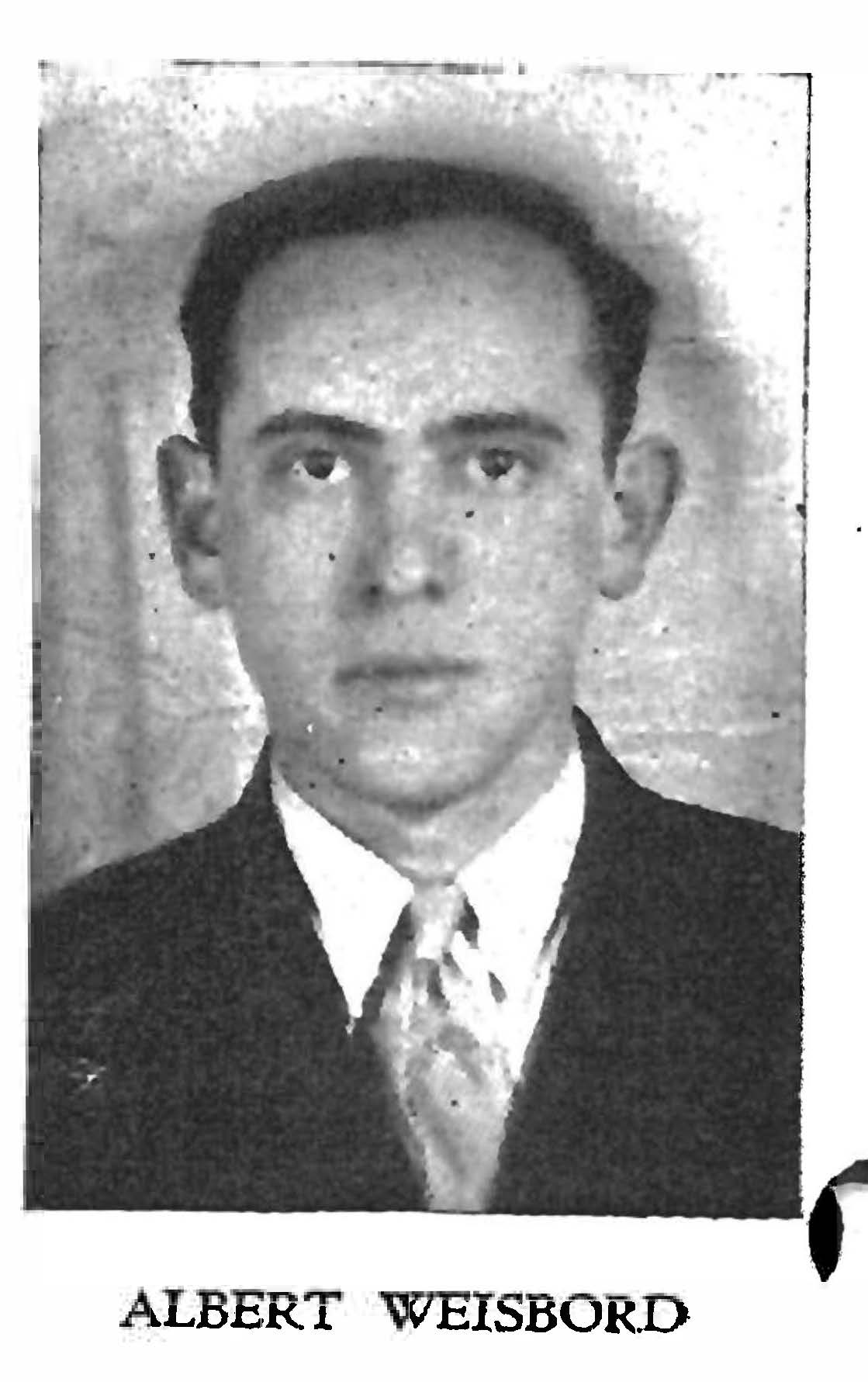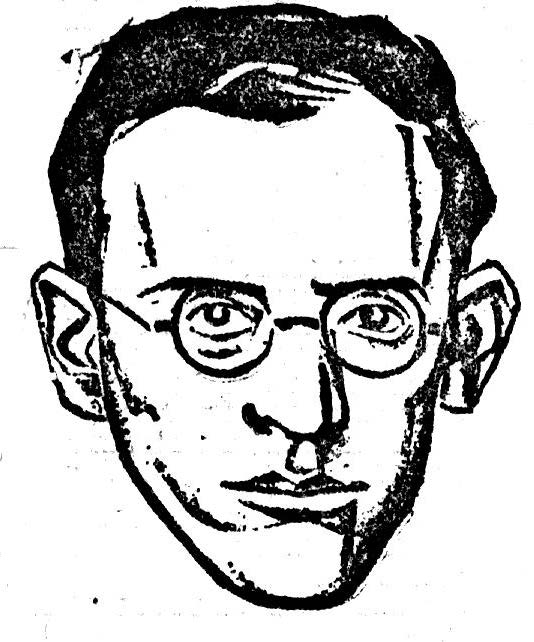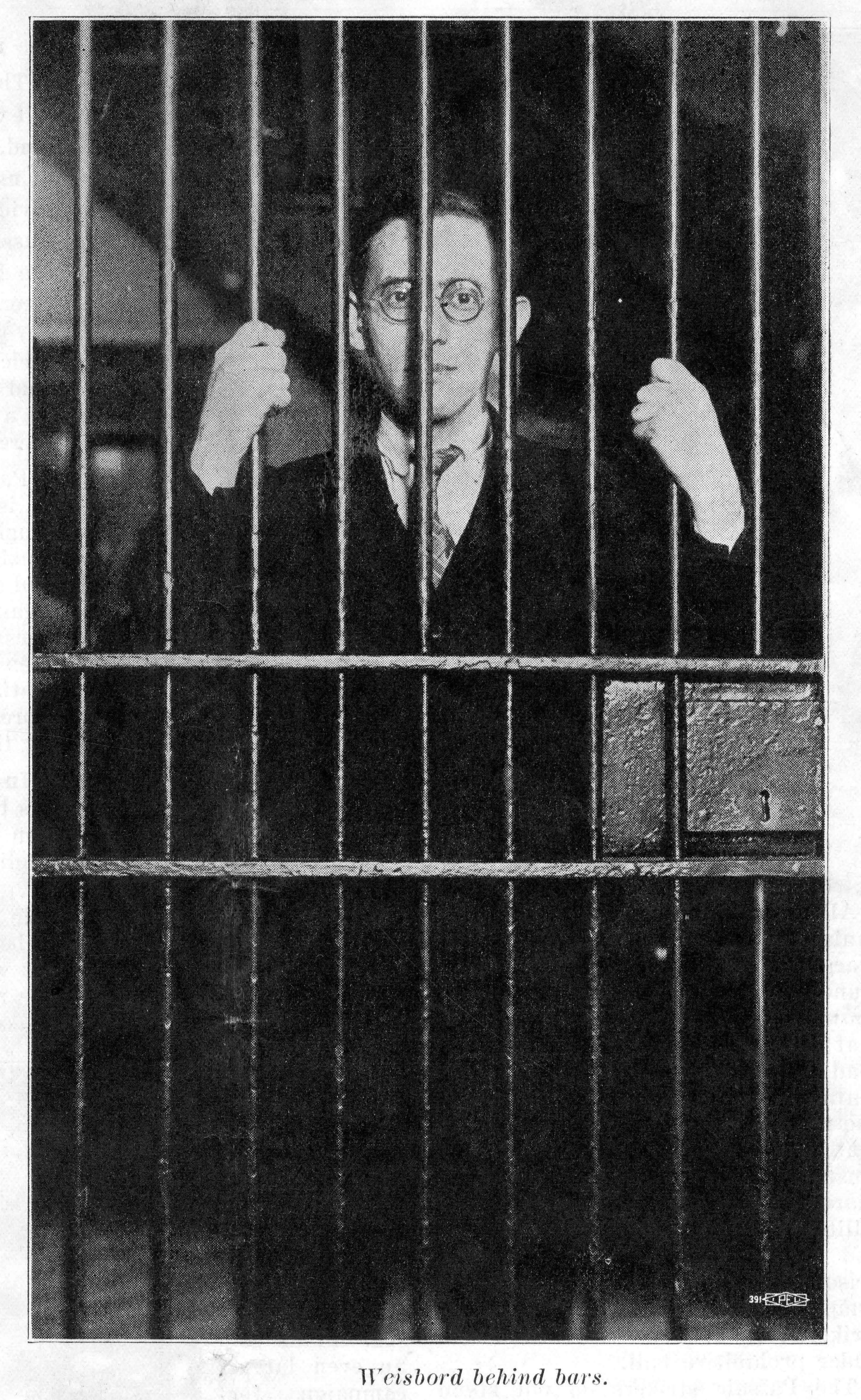The Albert & Vera Buch Weisbord Archives

This is the internet archives of Albert & Vera Buch Weisbord, Leading Communist Radicals of the 1930's. Organizers of 1926 Passaic Textile Strike, 1929 Gastonia Textile Strike, leaders of the Communist League of Struggle 1931-37.
Albert Weisbord was born in New York City on December 9, 1900 of poor Russian Jewish parents. He graduated Phi Beta Kappa from the College of the City of New York in 1921. Upon graduation from CCNY he applied for the Harvard Law School ("not so much to study law, but to examine at close hand how law was the resultant of the action of social forces.") graduating with honors.
Albert joined the Brooklyn Branch of the Socialist Party, by 1920 he became an active organizer. In 1921 he was elected National Secretary of the Young Peoples Socialist League and later a member of the National Executive Committee of the Socialist Party. In 1924 he was a delegate to the Convention of the Conference for Progressive Political Action. Soon he would resign from the Socialist Party to join the Workers (Communist) Party. He moved to Paterson N.J. where he formed the United Front Committee of Textile Workers, and involved himself in a strike of Silk Mill Workers in West New York, N.J. From there he was on to Passaic where he organized a strike of over 16,000 workers. In Passaic he met Vera Buch.
Vera Buch was born August 19, 1895 in Forestville, Connecticut. As a child, she survived poverty in the tenements of New York. Vera attended Hunter High School (Valedictorian) and Hunter College where she won three First Prizes in French competition among colleges in the USA and Canada.
In a tuberculosis sanatorium Vera first became interested in the class struggle. In 1919 she joined the left wing of the Socialist Party, beginning a long period of work as a labor activist. She soon joined the Industrial Workers of the World, and then the Communist Party when it first formed in 1920. In 1922 she joined the Workers (Communist) Party. In 1926 she was sent to Passaic to help in the strike, there she met Albert Weisbord, who like Vera was a committed revolutionist.
After Passaic Albert and Vera were involved with the miners in the coal fields of Penn. (United Mine Workers) and in 1929 the Gastonia Textile Strike, where Vera was arrested for murder. In 1930 Albert and Vera separated from the Communist party and were briefly associated with The Left Opposition that was led by James P. Cannon and Max Shachtman (Communist League of America). At one point Albert was a Trotskyist but by 1931 he had moved outside of The Left Opposition towards a policy and program of his own.
In 1931 "The Communist League of Struggle" was formed with its official organ "The Class Struggle". During the entire publication of Class Struggle (1931-1937) Albert was the main contributor. In 1932 Albert visited with Leon Trotsky for three weeks in Turkey. Latter he traveled to Germany and Spain, of these visits articles can be found in the collections of Class Struggle.
In 1937 Albert's book, "The Conquest of Power" was published, in 1964 his book "Latin American Actuality" was published. Vera's book "A Radical Life" was published in 1977 by Indiana University Press.
Albert Weisbord died in 1977.
Vera Buch Weisbord died in 1989.
ARTICLES:
1918: Spring Comes Again, Vera Buch, The Liberator, July 1918
1924: Looping Silk Stockings, [poem] Vera Buch, Daily Worker, August 2, 1924
1925: Silk Weaver Tells of Work Conditions, Albert Weisbord, Daily Worker, July 7, 1925
 1925: Textile Mills are Slave Pens for the Workers, Albert Weisbord, Daily Worker, August 28, 1925
1925: Textile Mills are Slave Pens for the Workers, Albert Weisbord, Daily Worker, August 28, 1925
1925: Silk Workers' Unions Set Up United Front, Albert Weisbord, Daily Worker, October 29, 1925
1925: Seek to Widen Passaic Strike to More Mills, Albert Weisbord, Daily Worker, October 29, 1925
1925: Silk Workers on Strike Against Speed-up System, Albert Weisbord, Daily Worker, October 30, 1925
1925: United Front Committee in Passaic Mills, Albert Weisbord, Daily Worker, November 5, 1925
1925: Hillcrest Mill Strikers Build Mill Committee, Albert Weisbord, Daily Worker, November 5, 1925
1925: Hillcrest Silk Mill Strikers Tie-Up Factory, Albert Weisbord, Daily Worker, November 13, 1925
1925: Eighth Week of Strike Finds Hillcrest Silk Mill Strikers Firm; Scabs Reported to Have Quit, Albert Weisbord, Daily Worker, December 16, 1925
1925: Socialists Show Traitor Face to Silk Strikers, Albert Weisbord, Daily Worker, December 17, 1925
1926: Passaic Textile Workers Will Strike Until Demands Are Won, Declares Strikers' Committee, Daily Worker, April 3, 1926
1926: Organize the Women for Class Struggle, Vera Buch, Daily Worker, November 27, 1926
1926: After Ten Months of Silence, Whir of Mills is at Passaic Worsted as Company Signs Up, Vera Buch, Daily Worker, November 28, 1926
1926: United Council of Working Class Housewives Protests Fire-traps, Vera Buch, Daily Worker, December 10, 1926
1926: An Appeal [for the Daily Worker], Albert Weisbord, Daily Worker, December 18, 1926
1926: Weisbord Hails Victory of Passaic Textile Strikers; Urges Workers to Fight on for 100 Per Cent Union, Daily Worker, December 21, 1926
1926: Lessons from Passaic, Albert Weisbord, Workers Monthly, December 1926
Passaic Textile Strike of 1926:
Passaic
Passaic Reviewed
Strike Bulletins Part 1
Strike Bulletins Part 2
Strike Bulletins Part 3
1927: Passaic Strike District to Show Gratitude to Daily Worker; Behind Workers' press Ball at Garfield, Vera Buch, Daily Worker, January 12, 1927
1927: School Opened in Passaic to Continue Class United Front Committee Started, Vera Buch, Daily Worker, January 25, 1927
1927: Commission Form Exposed in Passaic, Albert Weisbord, Daily Worker, May 9, 1927
1927: Katie, a Miner's Child, Vera Buch, Daily Worker, August 16, 1927
1927: Militancy Grows Among the Textile Workers in Anthracite Regions, Vera Buch, Daily Worker, September 23, 1927
1928: Why the Working Woman Needs a Labor Party, Vera Buch, Daily Worker, January 24, 1928
1928: National Woman's Party Not for Labor, Vera Buch, Daily Worker, March 19, 1928
1928: "Maw" Guynn Leads the Mine Women of Lansing, Vera Buch, Daily Worker, June 19, 1928
1928: The New Bedford Textile Strike, Albert Weisbord, Labor Unity, June 1928
1928: Militant Mine Family Blacklisted Since 1919, Vera Buch, Daily Worker, July 16, 1928
1928: The Present Situation in New Bedford, Albert Weisbord, Labor Unity, July 1928
1928: Some Aspects of the Situation in New Bedford, Albert Weisbord, The Communist, July 1928
1928: Functioning of a Detroit Shop Nucleus, Vera Buch, Party Organizer, July-August 1928
1928: Peculiar Sidelights on New Bedford, Albert Weisbord, Labor Unity, August 1928
1928: Three Strategies in the New Bedford Strike, Albert Weisbord, The Communist, August 1928
1928: Twenty-six Thousand Marching Men in New Bedford, Albert Weisbord, Labor Defender, August 1928
1928: Women Assist in Mine Relief, Vera Buch, Daily Worker, August 6, 1928
1928: The Fall River Stroke, Albert Weisbord, Labor Unity, September 1928
1928: The Daily Worker in Textile Strike, Albert Weisbord, Daily Worker, September 8, 1928
1928: Mill Workers Must Build Union, Albert Weisbord, Daily Worker, October 23, 1928
1928: Hail Building of Silk Union, Daily Worker, December 4, 1928
1929: Women Workers Rally to Fight Against Imperialism, Vera Buch, Daily Worker, January 22, 1929
 1929: Support the Central Executive Committee; Criticize Its Too Many Right Errors!, Albert Weisbord, Daily Worker, January 24, 1929
1929: Support the Central Executive Committee; Criticize Its Too Many Right Errors!, Albert Weisbord, Daily Worker, January 24, 1929
1929: Working Women Must Fight Jingoes, Vera Buch, Daily Worker, February 1, 1929
1929: Working Women and Next War, Vera Buch, Daily Worker, February 2, 1929
1929: Mexico Series: Mexicans in the United States, Albert Weisbord, Daily Worker, February 15, 1929
1929: Mexico Series: Conditions in Mexico, Albert Weisbord, Daily Worker, February 16, 1929
1929: Mexico Series: Mexican Workers Badly Paid, Albert Weisbord, Daily Worker, February 18, 1929
1929: Mexico Series: The Bloc of Workers, Agrarians, Albert Weisbord, Daily Worker, February 19, 1929
1929: Mexico Series: The Assembly for Unification, Part I; Part II, Albert Weisbord, Daily Worker, February 20, 21, 1929
1929: Mexico Series: T.U.E.L. Report at Mexican Congress, Part I; Part II, Albert Weisbord, Daily Worker, February 22, 23, 1929
1929: Mexico Series: Mexican Masses Honor Mella, Albert Weisbord, Daily Worker, February 25, 1929
1929: Mexico Series: Communist Party of Mexico, Albert Weisbord, Daily Worker, February 27, 1929
1929: The Situation in Cuba, Albert Weisbord, Daily Worker, March 1, 1929
1929: The Tasks of Winning the Textile Working Women, Albert Weisbord, Daily Worker, March 9, 1929
1929: Letter to Robert Minor, [on work among Negroes in Bessemer City], Vera Buch, June 2, 1929
1929: Letter to William F. Dunne, [on Gastonia leaflet] Albert Weisbord, June 3, 1929
1929: Letter to Vera Buch, [on her letter to Minor] Albert Weisbord, June 5, 1929
1929: Passaic - New Bedford - North Carolina, Albert Weisbord, The Communist, June 1929
1929: Statement Regarding My Resignation as Secretary of the National Textile Workers Union, Albert Weisbord, June 19, 1929
1929: Report to C.E.C. on Meetings of the Textile Council Fraction and Top Fraction of the National Textile Workers Union, July 6,7, 1929
1929: Who Are the Gastonia Prisoners?: Vera Buch, Labor Defender, September 1929
1929: Decision on the Suspension of Albert Weisbord, Central Control Commission, CPUSA Daily Worker, December 16, 1929
Gastonia Textile Strike of 1929:
Strike at the Loray Mill
1930: The Gastonia Trial: One Year Later, Vera Buch, Revolutionary Age, May 1, 1930
1930: Unemployment and Vulgar "Marxism": About Browder's "Out of Work", Part I; Part II, Vera Buch, Revolutionary Age, June 15, August 1, 1930
1930: To Whose Advantage? The Suspension of Comrade Weisbord , Revolutionary Age, July 15, 1930
1930: Problems of the Revolutionary Movement. A Statement of Views on Some Disputed Questions, [from a speech to a plenum of the Communist Party (Opposition)] Albert Weisbord, The Militant, September 1 and 15, 1930
1930: The Position of Comrade Weisbord - and its Main Errors, Part I; Part II, Revolutionary Age, October 1, November 22, 1930
The Spanish Revolution:
The Spanish Revolution
The Spanish Revolution at the Crossroads
Long Live The Spanish Socialist Republic
The Underground Railway To Spain
Two Visits to Barcelona
Outcast Spain
The Huesca Front in Aragon
The Provocations of Bourgeois Democracy in Spain
Barricades in Barcelona
Perspectives of the Spanish Revolution
Collectivization in Catalonia
The Fight Within the Spanish Left
The P.O.U.M. in Spain
An Analysis of the Barcelona May Days
Unique Problems of the Spanish Revolution
Covering the Evacuation of the Refugees
Studies in the 1958 Depression, Business and Labor:
I The Program of Big Labor
II The Program of Big Business
III The Program of Little Business
Philosophy:
Scientific Materialism
State-Nation
The Laws of Movement of Capitalism
Offshoots of Liberalism—Feminism
Offshoots of Liberalism—Pacifism
Afro-American Committee:
Afro-American Manifesto
Afro-American Program of Action
Afro-American Guerilla Warfare (Draft)
La Parola del Popolo:
What About Russia
Bolshevism—Fraudulent Practice Of Democratic Centralism
The Masks and Ignorance of Bolshevism
A Lesson from Chile to Socialists
The Devil—A God Was He!
Review Of "Haymarket Revisited”
Professor Bruno Bettelheim's Foreword to "Auschwitz”
Feminism and Family Names
Notes on a Recent Trip
Perspective for the Portuguese Revolution
Whats Going On In Cuba
Does Mexico Need A Fidel Castro?
Mobilization Against Cuba in Latin America
Perspectives of the Cuban Revolution
Chronic Crisis in Latin America
Castroism—Deadly Danger to the Cuban Revolution
Moscow's Betrayal of the Cuban Revolution
Viva Cristo Rey!
Theses on the Communist Parties in the West
The Comming Dissolution of NATO
Bologna: Rose Colored and Red
On Busing and of The Bakke Case
Italian Strikers in Lodi, N.J. 1926
Remember Sacco and Vanzetti
A Women Writes About Rape, A Book Review
Miscellaneous:
The Strategy of the Fourth International
Critique of the Draft Program of the C.P.S.U.
Stalinism—Before and During World War II
The "-ism" in Marxism
Correspondence With Liborio Justo
Correspondence With Theodore Draper
The Party Record of James P. Cannon
A Brief Explaination of Taxation for Workers
Recipe For The Defeat Of Nazism
Weisbord’s Reply to Trotsky’s Letter–1932
The Militant: (Communist League of America)
Problems of the Revolutionary Movement
A Concrete Program for the Unemployed
Communist League of Struggle:
Communism and the Social Order
Theses of the Communist League of Struggle
The Struggle of the Unemployed
The Struggle for Negro Emancipation
For A New Communist International
The Class Struggle:
Volume 1 Number 1, May 1931
Volume 1 Number 2, June 1931
Volume 1 Number 3, August/September 1931
Volume 1 Number 4, October/November 1931
Volume 1 Number 5, December 1931
Volume 1 Number 6, December 1931
Volume 2 Number 1, January 1932
Volume 2 Number 2, February 1932
Volume 2 Number 3, March 1932
Volume 2 Number 4, April 1932
Volume 2 Number 5, May 1932
Volume 2 Number 6, July 1932
Volume 2 Number 7, August 1932
Volume 2 Number 8, September 1932
Volume 2 Number 9, October 1932
Volume 2 Number 10-11, November/December 1932
Volume 3 Number 1, January 1933
Volume 3 Number 2, February 1933
Volume 3 Number 3-4, March 1933
Volume 3 Number 5, May 1933
Volume 3 Number 6, June 1933
Volume 3 Number 7, August 1933
Volume 3 Number 8, August 1933
Volume 3 Number 9, September 1933
Volume 3 Number 10, November 1933
Volume 4 Number 1, January 1934
Volume 4 Number 2, February 1934
Volume 4 Number 3, March 1934
Volume 4 Number 4-5, April-May 1934
Volume 4 Number 6-7, June-July 1934
Volume 4 Number 8, August 1934
Volume 4 Number 9-10, October 1934
Volume 4 Number 11, November 1934
Volume 5 Number 1, January 1935
Volume 5 Number 2, February 1935
Volume 5 Number 3, March 1935
Volume 5 Number 4, April 1935
Volume 5 Number 5, May 1935
Volume 5 Number 6, June 1935
Volume 5 Number 7-8, August 1935
Volume 5 Number 9-10, October 1935
Volume 5 Number 11, November 1935
Volume 5 Number 12, December 1935
Volume 6 Number 1, January 1936
Volume 6 Number 2, February 1936
Volume 6 Number 3-4, August 1936
Volume 6 Number 5, September 1936
Volume 6 Number 6, October 1936
Volume 6 Number 7, November 1936
Volume 6 Number 8, December 1936
Volume 7 Number 1-2, February 1937
Volume 7 Number 3, March 1937
Volume 7 Number 4-5, April/May 1937
The Conquest of Power:
Book Reviews of "The Conquest of Power”
Preface & Introduction to "The Conquest of Power”
Contents of Volume One
Book One Liberalism
I. Liberalism's Road to Power
1. The English Civil Wars
2. The American Revolution
3. The French Revolution
II. Liberalism's Comming of Age
4. Utilitarianism, Laissez-Faire and Individualism
5. Continental Liberalism
III The Wane of Liberalism
6. Welfare-Liberalism
7. The Dissolution of Liberalism
Book Two Anarchism
I. Liberal-Anarchism
8. Libertarianism
9. Mutualism
10. American Liberal-Anarchism
II. Communist-Anarchism
11. Collectivist-Anarchism
12. Communist-Anarchism
Book Three Syndicalism
I. Trade Union Reformism
13 Trade Unionism
II. Trade Union Revolutionism
14 French Syndicalism
15. American Revolutionary Industrial Unionism
BOOK IV. Socialism
I. Foundations of Socialism
16. The Background
17. Scientific Socialism
18. Early Socialists
19. The First International
II. The Second International
20. Revisionism
21. Sectarianism
III. Counter-Revolution
22. Socialism and The War
23. Socialism and The Proletarian Revolution
Contents of Volume Two
Book Five Fascism
I. Foundations of Fascism
24. Chronic Crisis
25. The Age of Violence
26. Fascist Prototypes
II. Fascism Arrives
27. The End of Reform
28. Italy
29. German National Socialism
30. National Socialism (continued)
31. The Spread of Fascism
32. Fascist Trends In The United States
33. The Future Physiognomy of American Fascism
Book Four Communism
I. The Zig-Zag Character of The Proletarian Revolution
34. Early Communist Uprisings
35. The Paris Commune
36. Bolshevism
37. The Russian Revolution of 1905
38. The Russian Revolution of 1917
39. The Russian Revolution (continued)
II. The Third International Under Lenin
40. The Post-War Revolutionary Wave
41. The First Four Congresses
III. Stalinism
42. The Swing To The Right
43. The Chinese Revolution
44. Socialism In One Country
45. Isolation and Collapse
46. Isolation and Collapse (continued)
47. Communism in The United States
IV. The Fourth International
48. The Strategy of the Fourth International
49. Communism and America
More documents will be added as they become transcribed.
If you have any comments or suggestions please e-mail at:
The Albert & Vera Weisbord Foundation
Chicago, Illinois
Last updated on 7 November 2024
 1925: Textile Mills are Slave Pens for the Workers, Albert Weisbord, Daily Worker, August 28, 1925
1925: Textile Mills are Slave Pens for the Workers, Albert Weisbord, Daily Worker, August 28, 1925
 1929:
1929: